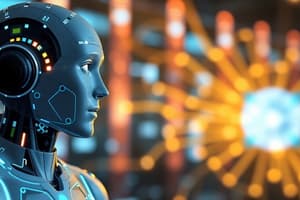Podcast
Questions and Answers
What is an agent in an AI system and what is its function?
What is an agent in an AI system and what is its function?
An agent in an AI system is anything that perceives its environment through sensors and acts on it through effectors, such as a human, robotic, or software agent. Its function is to interact with the environment and make decisions based on its percept sequence and built-in knowledge base to maximize its performance measure.
What is the difference between a simple reflex agent and a model-based reflex agent?
What is the difference between a simple reflex agent and a model-based reflex agent?
A simple reflex agent chooses actions solely based on current percepts and is rational only if correct decisions are made based on those percepts. A model-based reflex agent uses a model of the world to choose actions and maintain an internal state.
What are the properties of environments in AI?
What are the properties of environments in AI?
Properties of environments in AI include discrete/continuous, observable/partially observable, static/dynamic, single/multiple agents, accessible/inaccessible, deterministic/non-deterministic, and episodic/non-episodic.
Flashcards
AI Agent
AI Agent
An AI agent is something (human, robotic, or software) that observes the environment (sensors) and acts in response (effectors) to maximize its performance.
Simple Reflex Agent
Simple Reflex Agent
An AI agent that decides on actions based exclusively on its current perception, without a model of the world.
Model-based Reflex Agent
Model-based Reflex Agent
An AI agent that uses a model of the environment to decide on actions, and keeps track of its internal state.
AI Environment Properties
AI Environment Properties
Signup and view all the flashcards
Discrete Environment
Discrete Environment
Signup and view all the flashcards
Continuous Environment
Continuous Environment
Signup and view all the flashcards
Observable Environment
Observable Environment
Signup and view all the flashcards
Partially Observable Environment
Partially Observable Environment
Signup and view all the flashcards
Dynamic Environment
Dynamic Environment
Signup and view all the flashcards
Static Environment
Static Environment
Signup and view all the flashcards
Study Notes
Agents and Environments in AI Systems
- An AI system consists of an agent and its environment, where agents act and environments may contain other agents.
- An agent is anything that perceives its environment through sensors and acts on it through effectors, such as a human, robotic, or software agent.
- Agent terminology includes performance measure, behavior, percept, percept sequence, and agent function.
- Rationality in AI refers to the status of being reasonable, sensible, and having good judgment based on expected actions and results.
- An ideal rational agent maximizes its performance measure based on its percept sequence and built-in knowledge base.
- Simple reflex agents choose actions solely based on current percepts and are rational only if correct decisions are made based on those percepts.
- Model-based reflex agents use a model of the world to choose actions and maintain an internal state.
- Goal-based agents choose actions to achieve goals and are more flexible than reflex agents.
- Utility-based agents choose actions based on a preference for each state and are useful when there are conflicting or uncertain goals.
- Environments in AI can be entirely artificial or rich and unlimited, with some agents existing in both real and artificial environments.
- The Turing Test measures the success of an intelligent behavior in a system by testing it against human intelligence.
- Properties of environments in AI include discrete/continuous, observable/partially observable, static/dynamic, single/multiple agents, accessible/inaccessible, deterministic/non-deterministic, and episodic/non-episodic.
Studying That Suits You
Use AI to generate personalized quizzes and flashcards to suit your learning preferences.




